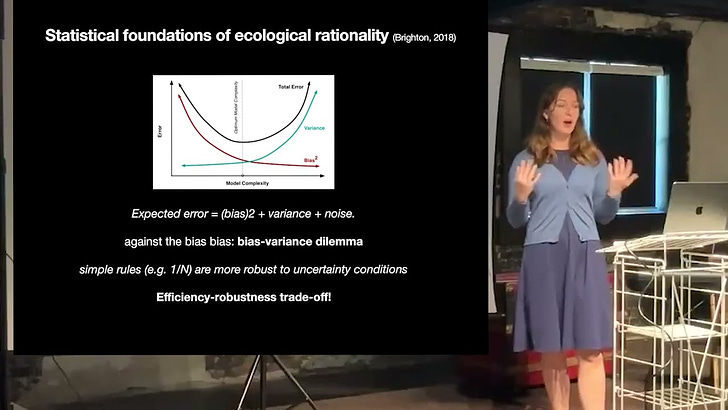Rationality and Relevance Realization: Metarationality and Generative Rationality
Recording of the talk at Fluidity Forum
The talk “Rationality and Relevance Realization: Metarationality and Generative Rationality” at Fluidity Forum in September 2023 touched on all topics the event was about: rationality, metarationality, sense-making, and metamodernity. Additionally, it treats topics of meaning, human perception, Heideggerian AI, Buddhist groundlessness, the cognitive science of 4D chess, perspectival realism, and more.
In this post, you will find:
Most importantly, the video recording of the talk held at Fluidity Forum in September 2023
1.1 An earlier recording of the same talk at a Rationality Vienna Lecture from January 2023
Additional comments and clarifications on the content of the presentation
Further Links and References
1. Fluidity Forum Recording of “Rationality and Relevance Realization”
Matt Arnold, the organizer of Fluidity Forum, produced and released the recordings on his Fluidity Forum Newsletter and YouTube channel some days ago. Here it is.
Sadly, the audio is not as good as intended due to technical difficulties. I hope the quality of the ideas makes up for it.
The talk builds on research I did for my Master's thesis in cognitive science under the supervision of Dr. Johannes Jäger in the MEi: CogSci program at the University of Vienna and in collaboration with Prof. John Vervaeke. Multiple publications are forthcoming.
Thank you to Matt Arnold for initiating the event and all the other speakers and participants who made it a genuinely insightful gathering of minds.
1.1 Rationality Vienna Recording
Here is an earlier recording of the same talk, where some points were formulated differently. I recommend watching the recording above from Fluidity Forum first and only venture into this recording if you think a different formulation could help you understand the points better.
This was at a Rationality Vienna meetup in January 2023. I thank Matthias Samwald and Manuel Mörtelmaier for hosting my lecture. I am grateful for having had incredible humans like Olga Yakimenko, Viliam Bur, Vitalik Buterin, Rahul Siripurapu, and others in the audience.
2. Comments and Clarifications
Every slide or part could itself be a long presentation or lecture series; accordingly, the majority of things I could have said needed to be left unsaid. Here is a short list of essential things I want to add or clarify.
2.1 Rationality
I took the importance of rationality as self-evident, but it is not apparent, so let me clarify why we care and ought to care about rationality. Rationality is the question of judgment and decision-making, determining what is true (epistemic rationality) and deciding what to do (instrumental rationality). The former - judgment - matters because we must judge to know what to choose and do. We care about deciding what to do to reach our goals or, more simply, get what we want or what is good. More profoundly, one could say rationality is about realizing the good life. The same word is also a technical term to mean intelligence; the field of artificial intelligence was historically first intended to be called computational rationality. An intelligent agent can act in the world to reach its objectives. And whatever it deems good makes rationality good, because rationality is about realizing it. Rationality is not the same as rationalism.
2.2 Frame Problem
While I talk about the frame problem in-depth, I don’t clarify what the problem is. At every moment, you are surrounded by the world, which is everything that is the case. At every point, you zero in on any aspect of the world to foreground while intelligently ignoring everything else. The world is not “pregiven” to us; every situation has an infinite way of abstracting from it. A good account is Daniel Dennett’s text “Cognitive Wheels: The Frame Problem of AI” (1984).
2.3 Truth
In the recording from Fluidity Forum, I make some remarks about how, after realizing the importance of relevance, I can hardly empathize with the position of foregrounding the importance of truth. This is false; truth crucially matters, and an orientation towards finding the truth is, in most cases, relevant to determining relevance. We are embedded in a world that exists, and understanding how this world is is crucial to reaching our goals. However, for deciding what to do, relevance, or as John Vervaeke would say, the “transjective” is more important than truth. Many things are true about the world but irrelevant for action; truth is not sufficient but crucial.
Further, introducing perspectival realism saves truth from nihilism, relativism, monism, and Frankfurtian bullshit.
One of my favorite books to foster a truth-seeking stance is “The Scout Mindset” by Julia Galef.
2.4 Wisdom
While discussing meta-rationality and insight, I forgot to mention wisdom. According to John Vervaeke, wisdom is the process of self-transformation that overcomes illusionary or deceptive processing through continuous insight and, over time, realizes rationality. I recommend reading his publication together with Ferraro: “Relevance, Meaning, and the Cognitive Science of wisdom” (2013).
We need to individually and collectively develop wisdom to realize the good life together.
3. Further Links and References
For a comprehensive list of all references, please wait for my upcoming publications. Some you can find in the Preprint of mine and John Vervaeke’s work on “Rationality and Relevance Realization.”
Here is the mentioned talk by Ken Binmore on “Making Decisions in Large Worlds”:
Here is the mentioned talk between Jordan Peterson and John Vervaeke.
I also recommend "Three forms of meaning and the management of complexity" (2013), "The Meaning of Meaning" (2008) and, of course, "Maps of Meaning" (1999) by Dr. Peterson.
Here are John Vervaeke and me talking about our joint work:



